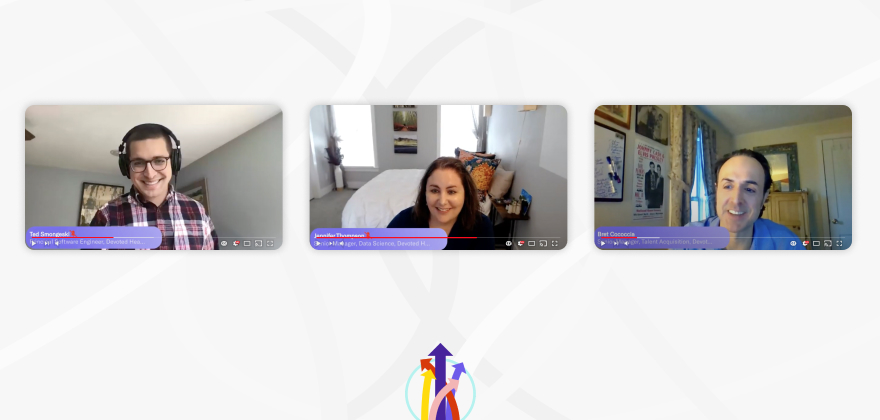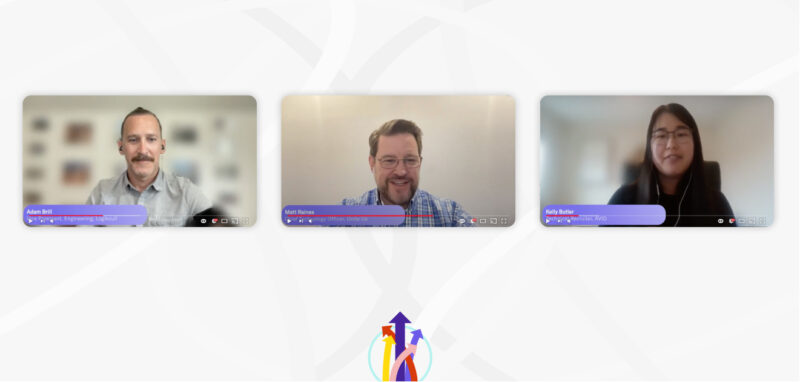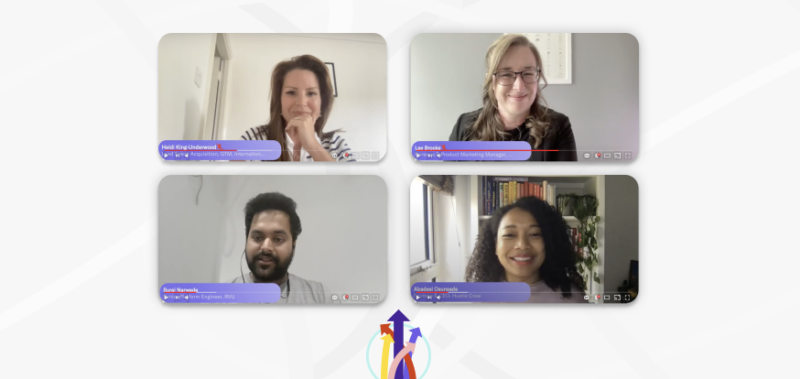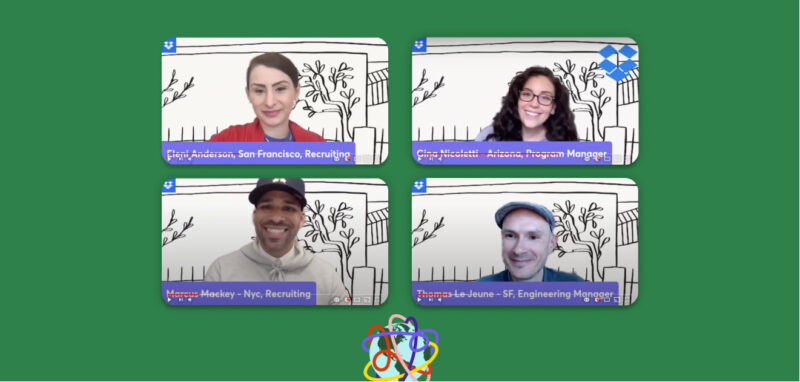
Tech at Devoted Health: The Power of Collaborative Problem-Solving (VIDEO)
Devoted Health is on a mission to change the face of US healthcare for seniors. Watch this on-demand webinar from the Get Hired Summit to hear from members of the Devoted Health tech teams.
They discuss how their obsession with leverage balanced with pragmatism enables better healthcare for America’s elders, and what they look for when searching for folks to join the team. They also share the areas remaining constant (a culture of collaborative problem-solvers) and the areas where change is the constant (based on specific needs or circumstances).
You’ll hear from these Devoted Health team members:
- Senior Manager, Data Science, Jennifer Thompson
- Principal Software Engineer, Ted Smongeski
- Senior Manager, Talent Acquisition, Bret Cococcia
Related: Hired’s 2022 List: Top Employers Winning Tech Talent
Read an excerpt of the conversation here and scroll down to access the full webinar.
What are some of the projects your teams are working on right now?Jennifer
There’s a lot going on across the organization. I work closely with Devoted Medical. Over the last few years, we’ve started a number of programs and clinical interventions for our membership. This includes diabetes manager prevention programs and our intensive home care program, which works closely with our most complex members who have a lot of comorbidities and some functional limitations. There’s a lot going on to try to make their lives better by improving their medical experience.
I’ve been here four years, which more or less maps with when we started taking care of people. We’ve had enough members go through some of those programs to where we’re able to zoom out and investigate what is working well and what isn’t. That way we can make decisions about where to grow our programs and how to expand those effective interventions to other markets.
I’ve personally been focused a lot on program effectiveness for the last month or so. We’re also devoting a lot of effort right now toward effectively and efficiently working with both our members and their physicians to make sure their medications are accessible and affordable. We’re working with the product, operations, and engineering colleagues to identify opportunities for automation like SMS reminders, but also understand and predict what members are most in need of. Given how quickly we’re able to build our software, we’re always focused on building and maintaining a robust data warehouse in an analytics layer that keeps up with all our workflows and data model improvements and allows a lot of self-serve across the organization.
Ted
I’m most excited about scaling and better utilizing the pipeline of medical documentation that we get. This whole healthcare system is a really challenging logistical process. It’s really important that we know as much about our members as we can so we can get them the right care at the right time.
Internally, we have a ton of integration set up with different provider groups and different sources of medical data that we ingest into our system. We’re starting to realize we have a lot of things but it’s getting more and more difficult to make sure folks inside Devoted are able to find those things appropriately. I get really excited about it because it’s this huge pipeline of data all the way to acquiring more documentation and setting up more types of integrations. Also internally, it’s making sure we’re indexing and cataloging that documentation with useful information so we can surface to several different consumer teams the right information.
For example, the Devoted Medical team is very interested in any given member’s full medical history. The Stars team, which manages the quality of care metrics we submit to CMS (Center for Medicare and Medicaid Services), is focused on making sure we’re doing preventive care for our members as part of those measures. Finding evidence we’ve provided that care not only helps Devoted with our quality of care overall but also helps with the whole coordination between all those parties to make sure we aren’t duplicating efforts across our members.
Tell us about the tools unique to Devoted’s data science and engineering teams.Jennifer
On the data side, we use Snowflake for data storage and SQL querying. We have an internal product that copies data from our Postgres database into Snowflake almost in real-time. We use DVT for our transformation layer and Airflow for scheduling. At Devoted, we migrated to Looker for our business intelligence tooling last year. We have Jupyter Hub available for in-depth analysis and model prototyping. We use both Python and R for those things depending on the project. Then we have the ML flow.
Ted
We use React and GraphQL for front-end layers. We use Postgres under the hood to store most of our transactional data. In the back end, we use Go as our primary coding language. For data modeling, we have a mature setup with Protocol Buffers, which is a data modeling language built by Google. We use the metadata associated with our models to generate basic front ends, our database tables, and tons of other metaprogramming concepts. I think that’s a secret sauce – the use of Protocol Buffers and meta-programming to help us stand up things really fast.
Related: Hired Releases 2023 State of Software Engineers Report
Watch the full panel discussion to learn:
- Career growth at Devoted Health
- How the teams determined their tech stack
- The teams’ day-to-day
- Why Devoted Health is like a layer cake!
Related blog posts

Future-Proof Your Tech Career: How to Make Strategic Decisions (VIDEO)
These days, making strategic career decisions is often tied to conversations about “quiet...

How to Create a Strong Personal Brand: The Key to Beginning a Networking Relationship (VIDEO)
A strong brand is not only relevant for businesses. It’s important for individuals too, especially...

Code Your Career: Staying Competitive in the Developer Job Market (VIDEO)
The world, especially within the tech industry, is changing faster than you realize. Many...

Interview to Get Hired: What Top Employers Want in 2023 (VIDEO)
What are top employers looking for from jobseekers? Watch this on-demand webinar to hear experts...

FAQs from Jobseekers: Approaching the Technical Interview with Confidence (VIDEO)
Technical interviewing takes skill and is actually a skill in itself. In this AMA-style discussion...

The Rise of Remote Work: A Deep Dive into Dropbox’s Transition Journey (VIDEO)
Insider Info from Recruiting and Engineering Leaders About Remote-First at Dropbox In...
